Conviction vs. Persuasion — What's the Difference?
By Maham Liaqat & Fiza Rafique — Updated on April 4, 2024
Conviction is a firmly held belief or opinion, while persuasion is the act of convincing someone to change their beliefs or actions.

Difference Between Conviction and Persuasion
Table of Contents
ADVERTISEMENT
Key Differences
Conviction refers to the strong belief an individual holds, often impervious to change despite external influences. It's a personal certainty about the truth or falsity of an idea, which guides one's actions and principles. On the other hand, persuasion is a process aimed at influencing someone's beliefs, attitudes, intentions, motivations, or behaviors through argumentation, dialogue, and various rhetorical strategies. While conviction is internal and steadfast, persuasion is an external process aimed at change.
While conviction arises from within, based on personal values, experiences, or evidence, persuasion involves external efforts by others to alter someone's beliefs or actions. A person's convictions can fuel their persuasive efforts, as they may seek to convince others of the value or truth of their deeply held beliefs. Conversely, effective persuasion can lead to the development or strengthening of convictions, as individuals adopt new beliefs as their own.
Convictions are often seen as non-negotiable, central to one's identity and ethical stance. They serve as a moral compass, influencing decision-making and behavior. Persuasion, however, is a skill or art that can be learned and applied in various contexts, from advertising and sales to politics and personal relationships. Its success largely depends on the methods used and the receptiveness of the audience.
The strength of conviction is measured by the degree of confidence and commitment one has to their beliefs, and it can be resistant to change even in the face of contrary evidence. Persuasion, in contrast, is measured by its effectiveness in changing someone's mind or behavior, requiring an understanding of psychology, communication techniques, and sometimes manipulation.
Conviction and persuasion interact within the landscape of human beliefs and actions. Convictions guide individual behavior with unwavering principles, while persuasion plays a crucial role in social dynamics, aiming to bridge gaps between differing convictions through communication and influence.
ADVERTISEMENT
Comparison Chart
Nature
Internal, steadfast belief or opinion.
Process of influencing others' beliefs or actions.
Origin
Arises from personal values and experiences.
Employed through argumentation and rhetoric.
Flexibility
Typically rigid and resistant to change.
Adaptable, aiming to be effective in changing minds.
Measurement
By the degree of personal commitment.
By effectiveness in altering others' perspectives or behaviors.
Role in Society
Guides individual behavior and moral compass.
Bridges gaps between differing beliefs through communication.
Compare with Definitions
Conviction
A firmly held belief or opinion, often considered non-negotiable by the holder.
She had a strong conviction about the importance of honesty, guiding her actions.
Persuasion
The act of convincing someone to change their beliefs, attitudes, or actions.
Through persuasion, he convinced his friend to adopt a more sustainable lifestyle.
Conviction
Arises from deep personal values or compelling evidence.
His conviction in climate change was solidified by extensive research and data.
Persuasion
Utilizes argumentation, dialogue, and rhetorical strategies.
She used emotional appeals and logical arguments for persuasion in her speech.
Conviction
Influences actions and decisions based on personal principles.
Conviction led her to participate actively in social justice causes.
Persuasion
Measured by the change in others' beliefs or actions.
The campaign's persuasion was evident in the increased public support for the cause.
Conviction
Typically resistant to external influences and contrary evidence.
Despite opposing views, his convictions about healthy eating remained unchanged.
Persuasion
Can be developed and applied in various contexts for influence.
His persuasion skills were instrumental in negotiating successful business deals.
Conviction
Rooted in personal belief systems, independent of others' influence.
Her conviction about animal rights was developed through personal experiences and reflection.
Persuasion
Involves efforts to alter someone's perspective or behavior.
Persuasion played a key role in changing public opinion on the legislation.
Conviction
In law, a conviction is the verdict that usually results when a court of law finds a defendant guilty of a crime. The opposite of a conviction is an acquittal (that is, "not guilty").
Persuasion
Persuasion or persuasion arts is an umbrella term of influence. Persuasion can attempt to influence a person's beliefs, attitudes, intentions, motivations, or behaviors.Propaganda is a form of persuasion used to persuade a large audience using for the purposes of the individual or group producing the propaganda.
Conviction
The judgment of a jury or judge that a person is guilty of a crime as charged.
Persuasion
The act of persuading or the state of being persuaded
"The persuasion of a democracy to big changes is at best a slow process" (Harold J. Laski).
Conviction
The state of being found or proved guilty
Evidence that led to the suspect's conviction.
Persuasion
The ability or power to persuade
"Three foremost aids to persuasion which occur to me are humility, concentration, and gusto" (Marianne Moore).
Conviction
The act or process of convincing.
Persuasion
A strongly held opinion; a conviction
"He had a strong persuasion that Likeman was wrong" (H.G. Wells).
Conviction
The state or appearance of being convinced
She spoke with real conviction on the matter.
Persuasion
A body of religious beliefs; a religion
Worshipers of various persuasions.
Conviction
A fixed or strong belief.
Persuasion
A party, faction, or group holding to a particular set of ideas or beliefs.
Conviction
(countable) A firmly held belief.
Persuasion
(Informal) Kind; sort
"the place where ... rockers of any gender or persuasion can become megastars" (Christopher John Farley).
Conviction
(countable) A judgement of guilt in a court of law.
Persuasion
The act of persuading, or trying to do so; the addressing of arguments to someone with the intention of changing their mind or convincing them of a certain point of view, course of action etc.
Conviction
(uncountable) The state of being found or proved guilty.
Persuasion
An argument or other statement intended to influence one's opinions or beliefs; a way of persuading someone.
Conviction
(uncountable) The state of being wholly convinced.
Persuasion
A strongly held conviction, opinion or belief.
It is his persuasion that abortion should never be condoned.
Conviction
The act of convicting; the act of proving, finding, or adjudging, guilty of an offense.
The greater certainty of conviction and the greater certainty of punishment.
Persuasion
One's ability or power to influence someone's opinions or feelings; persuasiveness.
Conviction
A judgment of condemnation entered by a court having jurisdiction; the act or process of finding guilty, or the state of being found guilty of any crime by a legal tribunal.
Conviction may accrue two ways.
Persuasion
A specified religious adherence, a creed; any school of thought or ideology.
Conviction
The act of convincing of error, or of compelling the admission of a truth; confutation.
For all his tedious talk is but vain boast,Or subtle shifts conviction to evade.
Persuasion
The act of persuading; the act of influencing the mind by arguments or reasons offered, or by anything that moves the mind or passions, or inclines the will to a determination.
For thou hast all the arts of fine persuasion.
Conviction
The state of being convinced or convicted; strong persuasion or belief; especially, the state of being convicted of sin, or by one's conscience.
To call good evil, and evil good, against the conviction of their own consciences.
And did you presently fall under the power of this conviction?
Persuasion
The state of being persuaded or convinced; settled opinion or conviction, which has been induced.
If the general persuasion of all men does so account it.
My firm persuasion is, at least sometimes,That Heaven will weigh man's virtues and his crimesWith nice attention.
Conviction
An unshakable belief in something without need for proof or evidence
Persuasion
A creed or belief; a sect or party adhering to a certain creed or system of opinions; as, of the same persuasion; all persuasions are agreed.
Of whatever state or persuasion, religious or political.
Conviction
(criminal law) a final judgment of guilty in a criminal case and the punishment that is imposed;
The conviction came as no surprise
Persuasion
The power or quality of persuading; persuasiveness.
Is 't possible that my deserts to youCan lack persuasion?
Persuasion
That which persuades; a persuasive.
Persuasion
The act of persuading (or attempting to persuade); communication intended to induce belief or action
Persuasion
A personal belief or judgment that is not founded on proof or certainty;
My opinion differs from yours
What are your thoughts on Haiti?
Persuasion
Inducement to act by argument or reasoning or entreaty
Common Curiosities
What is conviction?
Conviction is a deeply held belief or opinion, often central to one's identity and guiding principles.
What is persuasion?
Persuasion is the process of influencing someone to change their beliefs, attitudes, intentions, or actions.
What role does persuasion play in communication?
Persuasion is crucial in communication, aiming to bridge differences and influence opinions or actions through reasoned argumentation and emotional appeal.
Can a person's convictions be changed through persuasion?
While challenging, it's possible for effective persuasion to alter someone's convictions, especially if new information aligns with their values.
How do conviction and persuasion differ?
Conviction is an internal, steadfast belief, while persuasion is an external effort to influence or change someone's beliefs or actions.
Are there ethical considerations in persuasion?
Yes, ethical persuasion respects the audience's autonomy and avoids manipulation, focusing on honest and transparent communication.
Is persuasion always a positive process?
Not necessarily; while persuasion can foster positive change or mutual understanding, it can also be used manipulatively for selfish or harmful ends.
Can persuasion be learned?
Yes, effective persuasion techniques can be developed through study and practice, enhancing one's ability to communicate and influence.
How do convictions impact personal behavior?
Convictions guide decision-making and behavior, serving as a moral compass based on deeply held beliefs.
What makes a conviction strong?
A conviction is strengthened by deep personal commitment, often supported by values, experiences, or compelling evidence, making it resistant to change.
Share Your Discovery

Previous Comparison
Design vs. Sketch
Next Comparison
Experienced vs. CompetentAuthor Spotlight
Written by
Maham LiaqatCo-written by
Fiza RafiqueFiza Rafique is a skilled content writer at AskDifference.com, where she meticulously refines and enhances written pieces. Drawing from her vast editorial expertise, Fiza ensures clarity, accuracy, and precision in every article. Passionate about language, she continually seeks to elevate the quality of content for readers worldwide.















































